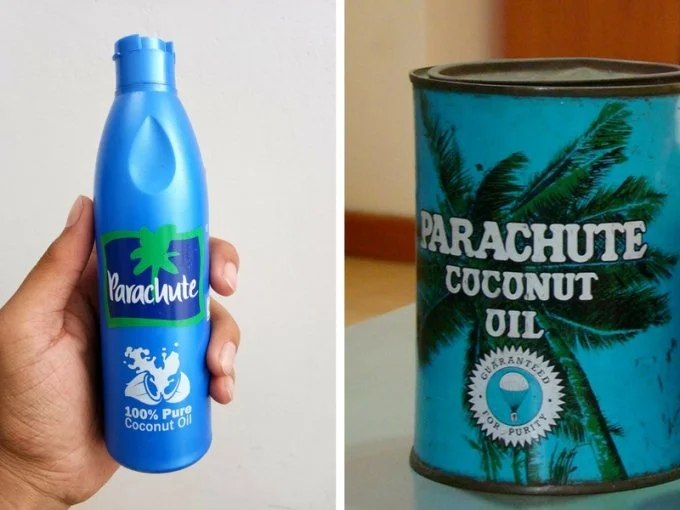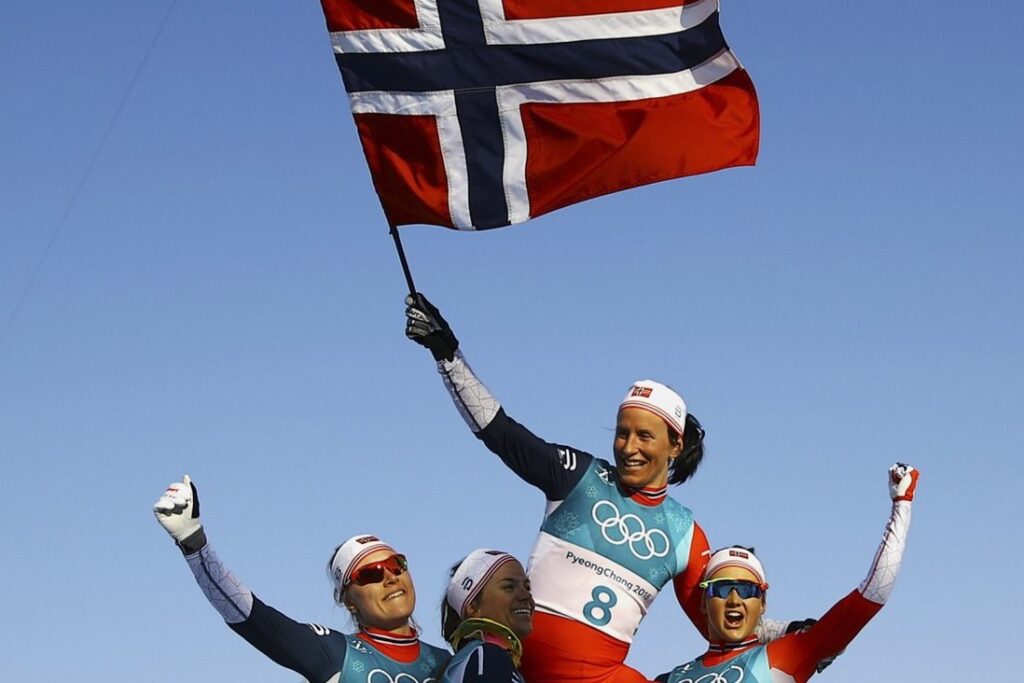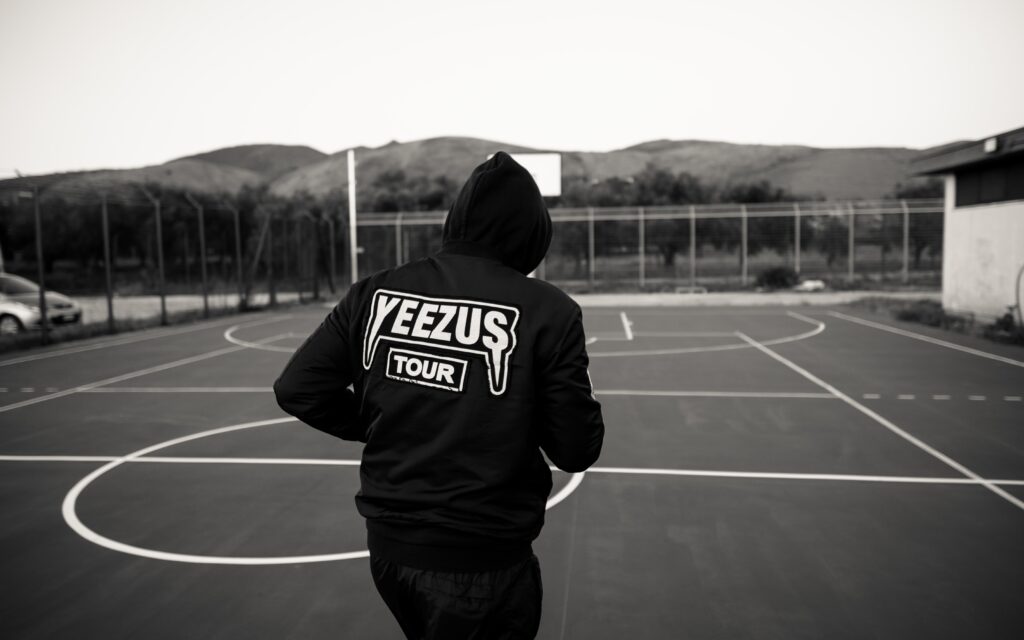Parachute – And the Success of the Brand

Parachute Coconut Oil, a leader in its category, is known for its purity and quality. The packaging of the company has seen several changes throughout the years.
Kanchi Morarji, hailing from Kutch in Gujarat, started this business in 1862. Later, he included his nephew, Vallabhdas, as a partner. The commission agency of Morarji and Vallabhdas first hit Kerala, as it was then the paradise of spices. Tonnes of turmeric, pepper, and ginger were then sent to Delhi, Amritsar, and Kolkata via trains.
Since there were minimal communication channels then, the traders dealing with spices had to believe what these two commission agents had to say about the demand and price of products in the North Indian markets. Their credibility was so high among traders that the latter started to rely on them entirely. Soon, the duo created a spice trading centre in Kerala. It was followed by the opening of a pepper processing unit in Alleppey. “Mari” means pepper in Gujarat. Soon, traders added this word to the ‘Vallabhdas’ name as a token of appreciation for their efforts in boosting the spice trade.
Vallabdas and his four sons set up Bombay Oil Industry Ltd in 1948 to promote the processing and sale of agro-products. They started three plants in Mumbai in the 1947–71 period. They created a company in Kerala instead of merely marketing in the state. Coconut oil, vegetable oil, and chemical substances were produced and sold.
Parachute coconut oil and Saffola safflower oil were launched and sold in bulk packaging by Bombay Oil.
Origin of Parachute
It was during World War II that Indians experienced the use of parachutes for the first time. The safe landing of parachutes by army men was a wonder then. People started associating parachutes with safety, security, and credibility. This is precisely why Bombay Oil gave this name to the coconut oil brand.
Creation of Marico

Marico Foods was set up in 1988 as a subsidiary of Bombay Oil Industries. Next year, it became Marico Industries Ltd. It was the beginning of setting up separate companies for different segments. Marico was launched in the consumer product category.
Vallabhdas’ son Harsh Mariwala, known for his organisational skills, soon took over the reins of the company in 1974. He started to give a new direction to the age-old business unit.
The Success of Parachute
When Harsh (Mariwala) joined Bombay Oil (in 1971), he realised that the oil business, the mainstay of Bombay Oil, was a commodity business with low margins. Parachute and Saffola were not getting the required attention through a brand lens. Parachute was sold in bulk, in tins of 15 litres to wholesalers, and Saffola was a niche business, selling in south Bombay (now Mumbai) and the posh localities of New Delhi.
Harsh had heard his uncles talk of a company in Calcutta (Kolkata) selling coconut oil in smaller packages under the brand Shalimar and making a higher margin than Bombay Oil. He also heard of distributors in Nagpur and the Vidarbha region selling smaller packages of Parachute coconut oil. Harsh wanted to see the success of the smaller packs himself.
Since Nagpur was closer than Calcutta, he first went to the Nagpur market. It was an eye-opener for him. Since he was the first member of the family to go on a market visit, it was also a revelation for the family. A visit to Calcutta followed the Nagpur visit; here, too, Harsh was fascinated by the retail opportunity in the Parachute market. Traders and consumers saw Parachute oil as a superior product. It had a rich coconut aroma that set it apart from other products in the market at that time. In terms of clarity and purity, it was better than the other oils being sold. However, Bombay Oil had put all its efforts into pushing the 15-litre tins. On the other hand, the wily wholesalers of Nagpur and Vidarbha knew the power of the Parachute brand. They pushed smaller packs of coconut oil and sold them to their customers.

FMCG Foray
The success of the Shalimar brand and the offtake of smaller packs in Vidarbha ignited in Harsh a passion for going retail with Parachute oil. He started touring more extensively and appointing distributors in western India’s interior markets. The products given to these distributors to sell were the retail packs of Parachute oil. After its success in west India, the model was also taken to other parts of the country. It was exciting for the young man to see his plan come to life, but the varied nature of the Indian market made him face problems he hadn’t expected.
Future-Ready.
The first hurdle before Harsh was building a marketing campaign that would work all over India. With some customer insights and smart marketing inputs, the brand identity chosen for Parachute was built around four values—purity, clarity, aroma, and tradition—chosen for their universal appeal. The strategy worked, and Parachute was soon the number one brand in its category.
Marketing campaigns alone, however, do not sell products. Another key reason for Parachute’s success was the packaging used by Harsh and his team. In the 70s, oil was sold in tins. Harsh wanted Parachute to be a premium brand and the packaging to reflect that. He told the team that he wanted to move from tins to plastic bottles. Plastic was cheaper than tins, and plastic bottles would look more attractive on the shelves.
But before making the changeover, he got a market survey carried out. The results were shocking.
The Ratty Problem
Traders had overwhelmingly given a thumbs-down to the plastic packaging. Harsh was crestfallen but delved deeper into the reasons for the traders’ apprehensions. Interestingly, he found that the culprits were rats! Rats love coconut oil. Unknown to Harsh, in the late 60s, someone had launched coconut oil in plastic bottles. Traders had found that the rats had feasted on the bottles, and the oil had oozed out, spoiling other products kept near the oil bottles. The traders, understandably, were not keen on having a repeat of this in their shops. Harsh’s team looked at the details and found that the earlier bottles were square. Therefore, the rats could get a grip on the bottles and gnaw at them.
Harsh had hired RV Bindumadhavan, a professional working at Ranbaxy. Bindumadhavan and the rest of the team got to work on the problem, and their solution was simple—round bottles made of superior plastic. The rats would not be able to get a grip on the bottles and, therefore, would not be able to sink their teeth into the plastic. Harsh also told his team to make sure that the packaging was leakproof.
But sellers were still apprehensive. Harsh and his team were in a fix. Unless the traders tried stocking the plastic Parachute bottles, they would not be able to see whether the bottles were rat-proof. But they did not want to risk any oil leaks. Desperate times call for desperate measures. The team conducted an experiment where they put eight to ten bottles of Parachute in a cage along with some rats. They locked the cell for two days, and the bottles were unscathed. This experiment was recorded on camera. The sales teams were told to use this evidence in their objection handling. The traders’ curiosity was aroused, and they each agreed to keep half a dozen bottles to see for themselves.
Slowly, the word spread and the plastic bottles of Parachute was on every shelf, and within a few years, the brand became the market leader.

Reference



